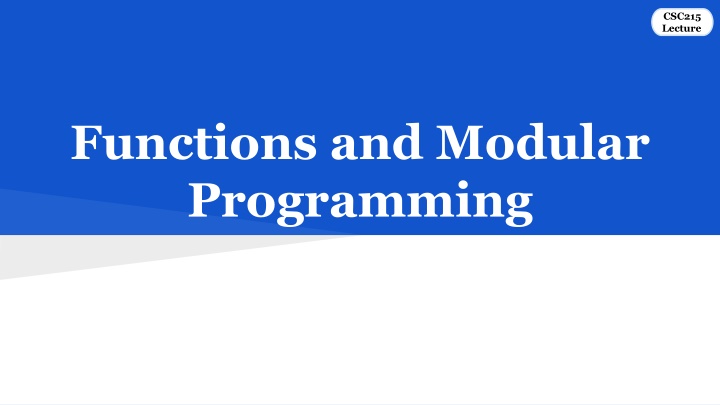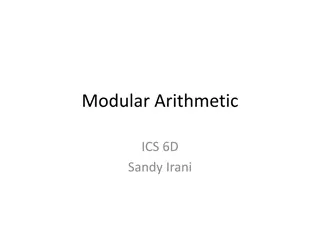
Functions and Modular Programming in C: Overview and Examples
"Learn about the importance of functions in C programming, including definitions, syntax, and examples. Explore the concept of modular programming and how it can enhance code organization and reusability."
Download Presentation

Please find below an Image/Link to download the presentation.
The content on the website is provided AS IS for your information and personal use only. It may not be sold, licensed, or shared on other websites without obtaining consent from the author. If you encounter any issues during the download, it is possible that the publisher has removed the file from their server.
You are allowed to download the files provided on this website for personal or commercial use, subject to the condition that they are used lawfully. All files are the property of their respective owners.
The content on the website is provided AS IS for your information and personal use only. It may not be sold, licensed, or shared on other websites without obtaining consent from the author.
E N D
Presentation Transcript
CSC215 Lecture Functions and Modular Programming
Outline Functions: Scopes Recursive functions Multiple source files Makefiles Need, Definition Defining functions Calling functions Prototypes Scope and visibility Storage classes
Introduction Design your solution so that it keeps the flow of control as simple as possible top-down design: decompose the problem into smaller problems each can be solved easily Some problems are complicated break them down into smaller problems conquer each sub problem independently Your programs will consist of a collection of user-defined functions each function solves one of the small problems you call (invoke) each function as needed
What is a Function? Function: a group of statements that together perform a task divide up your code into separate functions such that each performs a specific task every C program has at least one function, which is main() most programs define additional functions Why to avoid repetitive code : reusability written once, can be called infinitely to organize the program : making it easy to code, understand, debug and collaborate to hide details to share with others Defining functions: Predefined (library functions): We have already seen: printf, scanf, getchar, gets, puts User-defined : what is done vs how it is done
Defining Functions Syntax: <return_type> <function_name>(<parameter_list>){ <function_body> } Return_type: data type of the result Use void if the function returns nothing if no type is specified and void is not used: it defaults to int Function_name: any valid identifier Parameter_list: declared variables: <param_type> <param_name> comma separated Function_body: declaration statements other processing statements return statement, if not void
Example In many application, finding the greatest common factor is an important step GCF function: takes two input integers finds the greatest integer that divide both of them returns the result to the calling context Euclidean algorithm: if a > b gcf(a, b) = gcf(b, a mod b) if b > a, swap a and b Repeat until b is 0 In c: int gcf(int a, int b){ /* if a < b swap them, to be discussed later */ while (b) { int temp = b ; b = a % b ; a = temp ; } return a; }
Calling Functions Syntax: <function name>(<argument list>) A function is invoked (called) by writing: its name, and passing an appropriate list of arguments within parentheses arguments must match the parameters in the function definition in: 1- count , 2- type and 3- order Arguments are passed by value each argument is evaluated, and its value is copied to the corresponding parameter in the called function What if you need to pass the variable by reference? you cannot but you can pass its address by value
Calling Functions Example: /* Does not work as expected*/ void swap(int a, int b){ int temp = a; a = b; b = temp; } /* Works as expected*/ void swap(int *a, int *b){ int temp = *a; *a = *b; *b = temp; } int main(){ int a = 3, b = 5; swap(a, b); printf("a=%d, b=%d\n", a, b); return 0; } int main(){ int a = 3, b = 5; swap(&a, &b); printf("a=%d, b=%d\n", a, b); return 0; } a=3, b=5 a=5, b=3
Calling Functions A function can be called from any function, not necessarily from main Example: void swap(int *a, int *b){ int temp = *a; *a = *b; *b = temp; } int gcf(int a, int b){ if (b > a) swap(&a, &b); while (b) { int temp = b ; b = a % b ; a = temp ; } return a; } int main(){ int a = 3, b = 5; printf("GCF of %d and %d is %d\n", a, b, gcf(a, b) ); return 0; }
Declaring Functions Function Prototype If function definition comes textually after use in program: The compiler complains: warning: implicit declaration of function Declare the function before use: Prototype <return_type> <function_name>(<parameters_list>); Parameter_list does not have to name the parameters Function definition can be placed anywhere in the program after the prototypes. If a function definition is placed in front of main(), there is no need to include its function prototype.
Function Prototypes: Example #include <stdio.h> int gcf(int, int); void swap(int*, int*); int main(){ int a = 33, b = 5; printf("GCF of %d and %d is %d\n", a, b, gcf(a, b) ); return 0; } int gcf(int a, int b){ if (b > a) swap(&a, &b); while (b) { int temp = b ; b = a % b ; a = temp ; } return a; } void swap(int *a, int *b){ int temp = *a; *a = *b; *b = temp; }
Scopes Scope: the parts of the program where an identifier is visible Four scopes: File scope Identifiers defined out of any block or list of parameters Function scope Label names Must be unique within a function Block scope Identifiers declared inside a block or a list of parameters Local identifier A.K.A internal or automatic identifier Function prototype scope Identifiers declared inside a list of parameters of a function prototype If outer declaration of a lexically identical identifier exists in the same name space, it is hidden until the current scope terminates
Scopes: Examples Ex1: #include <stdio.h> Ex2: #include <stdio.h> Ex3: #include <stdio.h> Ex4: #include <stdio.h> void doubleX(float x){ x *= 2; printf("%f\n", x); } float x = 10; float x = 10; int main(){ int x = 5; if (x){ int x = 10; x++; printf("%d\n", x); } x++; printf("%d\n", x); return 0; } void doubleX(){ x *= 2; printf("%f\n", x); } void doubleX(float x){ x *= 2; printf("%f\n", x); } void printX(){ printf("%f\n", x); } int main(){ float x = 3; doubleX(x); printf("%f\n", x); printX(); return 0; } int main(){ float x = 3; doubleX(x); printf("%f\n", x); return 0; } int main(){ float x = 3; doubleX(); printf("%f\n", x); return 0; } 6.000000 3.000000 20.000000 3.000000 6.000000 3.000000 10.000000 11 6
Storage Classes Storage Classes: a modifier precedes the variable to define its scope and lifetime auto: the default for local variables register: advice to the compiler to store a local variable in a register the advice is not necessarily taken by the compiler static: tells the compiler that the storage of that variable remains in existence Local variables with static modifier remains in memory so that they can be accessed later Global variables with static modifier are limited to the file where they are declared extern: points the identifier to a previously defined variable Initialization: in the absence of explicit initialization: static and external variables are set to 0 automatic and register variables contain undefined values (garbage)
Storage Classes: Examples Ex1: Ex1: #include <stdio.h> #include <stdio.h> Ex1 correction: #include <stdio.h> Ex2: /*file1.c */ #include <stdio.h> int sp = 0; double val[1000]; double val[1000]; Ex2: /*file1.c */ #include <stdio.h> int sp = 0; Ex2 correction: /*file1.c */ #include <stdio.h> int sp = 0; double val[1000]; int main(){ float x = xx; float x = xx; int main(){ int main(){ extern float xx; float x = xx; return 0; return 0; int main(){ return 0; int main(){ return 0; } } int main(){ return 0; } } } return 0; float xx; float xx; } /*file2.c */ #include <stdio.h> #include <stdio.h> /*file2.c */ /*file2.c */ #include <stdio.h> extern int sp; extern double val[]; void foo(){ float x = xx; } float x = xx; float xx; void foo(){ void foo(){ float x = xx; } void foo(){ printf("%d", sp); } } void foo(){ printf("%d", sp); } /* void foo(){ printf("%d", sp); } int bar(){ return (int)val[0]; } xx is global/external But defined after main main doesn t know about xx /* /* int bar(){ return (int)val[0]; } } int bar(){ return (int)val[0]; declare xx in main as extern to point to the external xx, this will not create new xx */ */ */
Recursive Functions Recursive function: a function that calls itself (directly, or indirectly) Example: void change (count){ .. .. change(count); .. } The algorithm needs to be written in a recursive style a step or more uses the algorithm on a smaller problem size It must contain a base case that is not recursive Each function call has its own stack frame consumes resources
Recursive Functions: Examples Multiply x y: int multiply(int x, int y){ if (y == 1) return x; return x + multiply(x, y-1); } Power xy: int power(int x, int y){ if (y == 0) return 1; return x * power(x, y-1); } Factorial x!: int fac(int x){ if (x == 1) return 1; return x * fac(x-1); } Fibonacci: int fib(int x) { if (x == 0) return 0; if (x == 1) return 1; return fib(x-1) + fib(x-2); } Palindrome: int isPal(char* s, int a, int b) { if (b >= a) return 1; if (s[a] == s[b]) return isPal(s, a+1, b-1); return 0; }
Multiple Source Files A typical C program: lot of small C source files, rather than a few large ones each .c file contains closely related functions (usually a small number of functions) header files to tie them together Makefiles tells the compiler how to build them Example: a calc program defines: a stack structure and its: pop and push functions getch and ungetch to read one symbol at a time getop function to parse numbers and operators main function main calls: getop, pop, and push getop calls: getch and ungetch can be organized in 4 separate files: Where to place prototypes and external declarations? How to compile the program? /* stack.c */ #include <stdio.h> int sp = 0; double val[1000]; void push(double x){ ... } double pop(){ ... } /* getch.c */ #include <stdio.h> ch getch(){ ... } void ungetch(char c){ } /* main.c */ #include <stdio.h> /* getop.c */ #include <stdio.h> int main(){ int getop(char[] s){ } }
Multiple Source Files: Header File Prototypes can be placed in a single file, called a header file as well as all other shared definitions and declarations typically contains definitions and declarations but not executable code Example: calc program add a header file calc.h contains: prototypes and common declarations and include it where needed! /* stack.c */ #include <stdio.h> #include <stdio.h> #include "calc.h" int sp = 0; double val[1000]; void push(double x){ ... } double pop(){ ... } /* stack.c */ /* getch.c */ #include <stdio.h> #include <stdio.h> #include "calc.h" ch getch(){ ... } void ungetch(char c){ /* getch.c */ int sp = 0; double val[1000]; void push(double x){ ... } double pop(){ ... } ch getch(){ ... } void ungetch(char c){ /* calc.H */ void push(double); double pop(); ch getch(); void ungetch(charc); int getop(char[]); } } /* main.c */ /* main.c */ #include <stdio.h> #include <stdio.h> #include "calc.h" int main(){ /* getop.c */ /* getop.c */ #include <stdio.h> #include <stdio.h> #include "calc.h" int getop(char[] s){ int main(){ int getop(char[] s){ } } } }
File Inclusion Syntax: #include <filename> search for the file filename in paths according to the compiler defined rules replaced by the content if the file filename #include "filename" search for the file filename in source program directory or according to the compiler rules replaced by the content if the file filename When an included file is changed all files depending on it must be recompiled Multiple inclusion of a file: problem Circular inclusion: problem
Conditional Inclusion: include guard Control preprocessing with conditional statements Syntax: #if evaluates a constant integer expression if the expression is non-zero, all following lines until an #endif or #elif or #else are included #else , #elif provide alternative paths #endif marks the end of the conditional block Can be used to avoid repetitive and circular inclusions: included file: #if !defined(HDR) #define HDR /* contents of hdr.h go here */ #endif






















